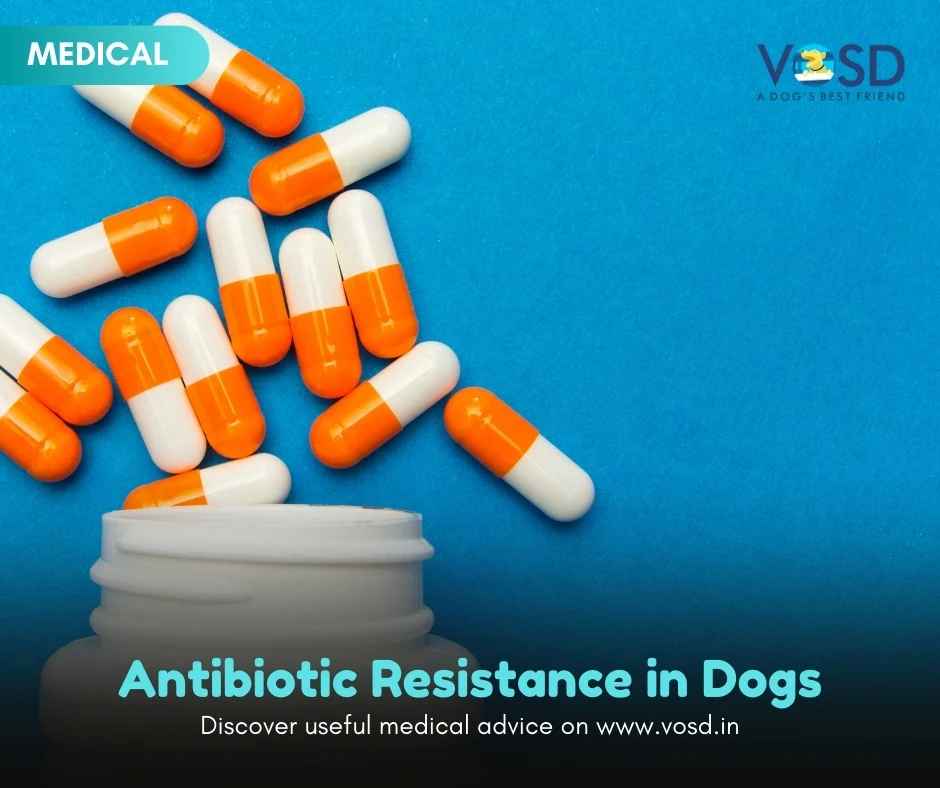It’s scary because it’s unexpected. How can medication make a dog sicker? Read our article to find out more.
Antibiotics are a very common treatment for all mammals and are used to eliminate bacteria, infections, illnesses, and germs. Doctors and veterinarians often rely on antibiotics to cure health disorders. So what happens when they cease to work? In fact, antibiotic resistance is actually on the rise – so what can veterinarians do about it? Is there an alternative?
Until then, we explore the true meaning of antibiotic resistance, especially in dogs. Learn about why it occurs and how the right treatment plan can help.
What is antibiotic resistance?
Antibiotic resistance does not just mean that the dog suddenly cannot handle the antibiotic. There has to be a host of factors (such as certain infections) that lead up to this problem. So what exactly is this?
Sometimes, infections affect the dog that are just resistant to antibiotics! There are many. Bacteria can mutate and gain superpowers of their own, and can eventually stop listening to the antibiotics fighting it off.
It is important to remember that antibiotic resistance does not mean the animal is resistant, but that the bacteria that affects the dog is antibiotics-resistant. Infections brought about by antibiotics-resistant bacteria are harder to treat because medicine has not yet evolved to accommodate this new strain of stronger bacteria.
Why does this happen in dogs?
The main reason is that overuse of antibiotics reduces the body’s ability to respond effectively. Over time, this resistance is passed down to the offspring, in turn creating more problems. Bacteria, after all, are living organisms fighting to survive just like us. So it makes sense that they will, over time, develop mechanisms to fight back when they are constantly drowning in medications. The bacteria, when exposed to the antibiotics all the time, soon stop listening to anyone else. They learn from their past experiences and become stronger.
Dogs that have parents who were given many antibiotics over the course of their lives are more susceptible to antibiotic resistant infections than others. Otherwise, they might have health problems that can escalate. Diabetes is a common disease that can lead to antibiotic resistant infections.
How do you treat this?
It is hard, expensive, and complicated to treat antibiotic resistance. What do you do when the medicine doesn’t work? Only the use of stronger, more extreme medication can do the job. This often comes at the cost of other health concerns too. A really strong medication can create a host of side effects that your dog may never recover from either.
It is never healthy to depend on antibiotics too much as a result of this.
The veterinarian will want to deal with underlying causes first. Is there a way to treat the disorder without using stronger antibiotics and other medication? If that is possible, it will be the first option that the veterinarian will provide for treatment.
Predisposed conditions can increase the risk of these infections coming back stronger than ever, which is why it is important to deal with the root of the problem. Your dog’s vet will therefore want to do several urine and blood tests, along with a full health check in order to determine what other health concerns exist.
The need for caution
While housing a dog in your home drastically decreases its risk of health issues, it is still important to shield your pet from resistant bacteria, albeit rare. Bacteria like E coli and Salmonella are getting increasingly resistant to antibiotics as they develop into stronger and more dangerous strains. When ingested by dogs, they can also impact human beings. Traces of this bacteria are found in stools, food, and so on. It is important to be cautious as a result.
What you can do
- The first step is to stop giving your dog antibiotics indiscriminately when it is unwell. Don’t allow the body to lose its ability to fight pathogens.
- Provide a nutrient-rich diet along with a solid exercise routine in order to maximise your dog’s immunity. Take it for regular health check ups so you can keep up to date with potential health concerns and nip them in the bud before they become extreme.
- Medical researchers are now trying to find alternatives to antibiotic treatment, in certain problems such as UTIs in dogs.
- Avoid giving your dog non vegetarian food that is unverified. Poultry is often injected with colistin to fatten them and make them seem healthier, but this also makes bacteria stronger in such a strong environment to thrive. Eating this meat can transfer to dogs and even humans, flummoxing medical professionals.
- Ensure that the water and food that you provide your dog is hygienic and cleaned properly. Don’t allow your dog to drink from stagnant water sources when outside the house.
Medicine is evolving fast in order to accommodate new strains of infection and new diseases, but unfortunately, these pathogens are evolving faster. This is why it helps to ensure that wellness happens from birth.
The information contained in VOSD Vet Advice™ is not intended nor implied to be a substitute for professional medical action which is provided by your vet. You assume full responsibility for how you choose to use this information. For any emergency situation related to a dog’s health, please visit the nearest veterinary clinic.





